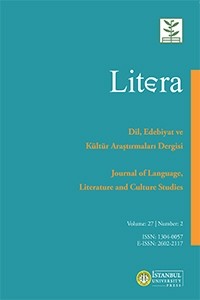Bledophilia and bledophobia as possible “answers” to exilience
Without being properly exiled, forced for political, ideological or religious reasons to leave their “matrie”, the protagonists (parents and children) of the novels from Maghrebian immigration all live a painful, sometimes exhausting, exile experience. Far from their home country or the land of their origin, they generally relate to it in two ways. On the one hand, there are those who remain strongly attached to their homeland or who carry it in their hearts as unalterable inheritance transmitted by their parents; they dream of the great return, which they succeed in accomplishing (sometimes only after their death) or not; they so venerate this distant land that they end up becoming unaware of the passing of time and the transformations (even alterations) that all that has remained there (objects, people) suffered. On the other hand, there are those who, for different reasons, want to erase their memories, who are striving (at all costs) to detach themselves from a stormy past, a hostile country (even enemy) to which nothing connects them except contempt, fear or disgust. To illustrate these two possible resolutions in the face of “exilience” - bledophilia and “bledophobia” - we rely on the novels Méchamment berbère by Minna Sif (1997), Mohand, le harki by Hadjila Kemoum (2003), Kiffe kiffe demain by Faïza Guène (2004), Pieds-Blancs by Houda Rouane (2006) and Un homme, ça ne pleure pas by Faïza Guène (2014).
Keywords:
bledophilia, bledophobia, exilience exile experience,
___
- Textes de références
- Guène, F. (2014). Un homme, ça ne pleure pas. Paris : Fayard.
- Guène, F. (2004). Kiffe kiffe demain. Paris : Hachette Littérature.
- Kemoum, H. (2013). Mohand le harki. Paris : éds. Anne Carrière.
- Rouane, H. (2006). Pieds-Blancs. Paris : Philippe Rey.
- Sif, M. (1997). Méchamment berbère. Paris : éds. Ramsay.
- Ouvrages critiques
- Abderrezak, H. (2012). Pieds-blancs de Houda Rouane ou la blédophilie en free style des descendants d’immigrés.
- In N. Redouane et Y. Bénayoun-Szmidt (dir.), Qu’en est-il de la littérature « beur » au féminin ? (pp. 311-321). Paris : L’Harmattan.
- Benslama, F. (2013). Les naufragés du natal. In L. Sebbar (dir.), Le pays natal (pp. 51-58). Tunis : Elyzad.
- Courrént, M. « Partir d’ici ». À propos de l’étymologie latine de l’exil. In H. Carrera (dir.), Exils (pp. 15-18). Perpignan : Presses Universitaires de Perpignan.
- Dahoun, Z. K. S. (1995). Les couleurs du silence, le mutisme des enfants de migrants. Paris : éd. Calmann-Lévy.
- Doinaş, Ş. A. (1997-1998). Între farsa tragică şi destin. Secolul 20, no 10-12/1997, 1-3/1998, « Exilul », 6-14.
- El-Khattabi, S. (2012). Exils, langues et générations : psychopathologie des inventions subjectives, pour une clinique du lien social contemporain. Thèse de doctorat, Université de Rennes 2.
- Hogikyan, N. (2003). De la mythation à la mutation : structures ouvertes de l’identité. In A. Nouss (dir.), Poésie, terre d’exil : autour de Salah Stétié (pp. 51-60). Montréal : éds. Trait d’union.
- Huston, N. (1999). Nord perdu suivi de Douze France. Montréal : éd. Leméac.
- Hugo, V. (1875-1876). Actes et paroles. Pendant l’exil. Paris : éds. M. Lévy frères.
- Kummer, I. (2013). Un ailleurs qui serait ici. In L. Sebbar (dir.), Le pays natal (pp. 114-123). Tunis : éd. Elyzad.
- Monique M. (2010). Entre-deux marseillo-maghrébin dans Méchamment berbère de Minna Sif. Les Cahiers du GRELCEF, no 1, « L’entre-deux dans les littératures d’expression française », 73-89.
- Nuselovici, A. (2013). L’exil comme expérience, texte rédigé dans le cadre du séminaire « L’expérience de l’exil » du Collège d’études mondiales (septembre à mai 2013, Paris), 1-11, disponible sur : http://halshs.archivesouvertes.fr/docs/00/86/12/45/PDF/FMSH-WP-2013-43_Nuselovici1.pdf
- Pinhas-Delpuech, R. «Va-t’en pour toi... ». In L. Sebbar (dir.), Le pays natal (pp. 136-145). Tunis : éd. Elyzad.
- Rey, A. (2010 [1993, 1995, 2000]). (dir.). Dictionnaire historique de la langue française, Nouvelle édition. Paris : Dictionnaires Le Robert.
- Rushdie, S. (1995). Patries imaginaires. Paris: Christian Bourgeois.
- Said, E. (2000). Reflections on Exile and Other Essays. Cambridge: Harvard University Press.
- Sayad, A. (1996). Le pays où l’on n’arrive jamais. Le courrier de l’Unesco, 9610, « Les Mondes de l’Exil », octobre, 10-12.
- Soler, A. (2012). Le milieu familial espace de conflit en structure migrante dans Méchamment berbère de Minna Sif. In N. Redouane et Y. Bénayoun-Szmidt (dir.), Qu’en est-il de la littérature « beur » au féminin? (pp. 97-116). Paris : L’Harmattan.
- Vasquez-Bronfman, A. (1991). La malédiction d’Ulysse. Hermès, no 10, « Cognition, Communication, Politique ». Paris : éds. du CNRS, 214-224.
- Dictionnaires
- Encyclopédie des gens du monde : répertoire universel des sciences, des lettres et des arts, tome X, Ière partie, 1838, disponible sur : http://gallica.bnf.fr/
- Dictionnaire du Moyen Français, disponible sur : http://www.atilf.fr/ https://www.cnrtl.fr/
- Başlangıç: 1954
- Yayıncı: İstanbul Üniversitesi
